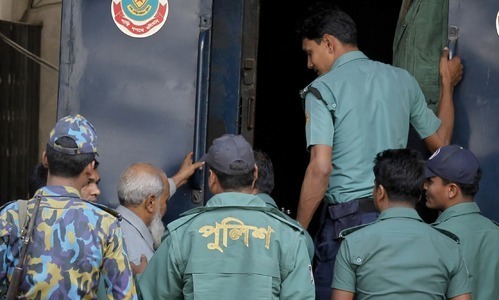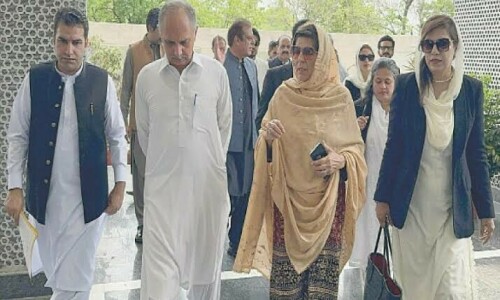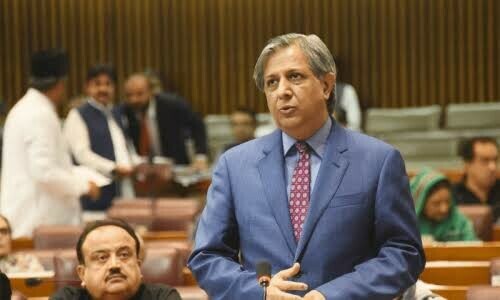
PAKISTAN’S Foreign Office says Pakistan is “deeply saddened” by the execution in Bangladesh last week of Mir Quasem Ali. Mir Quasem was found guilty in 2014 by a Bangladeshi court of torture, multiple murders and arson. He was sentenced to death after what Pakistan describes as “a flawed judicial process”.
But why is Pakistan so worried about the integrity of Bangladesh’s judicial process? And why does our government care so greatly about the death of another country’s citizen — one accused of heinous crimes? The answer: when it comes to Bangladesh, Pakistan remains chained to its past.
Abstract concern for human life cannot explain why the FO expressed such strong feelings. Certainly, the death sentences passed on countless people around the world meet with complete indifference. Those horrors have not elicited even a murmur of protest from Pakistan’s civil and military establishments. In fact, the killing of Pakistan’s own citizens in foreign lands meets with silence. Think of the long list of Pakistanis beheaded in the Kingdom of Saudi Arabia for drug smuggling after being tried there by kangaroo courts.
Rather than try to defend war criminals, Pakistan must normalise relations with Bangladesh.
As for the fairness of the judicial process in Bangladesh, Amnesty International and other leading human rights organisations had already raised serious concerns about the process under which war crimes are being handled. These include denying defence lawyers adequate time to prepare their cases, and arbitrarily limiting the number of witnesses they could call upon. But Pakistan can scarcely accuse Bangladesh of unfair trials because its own judicial system has even shakier legs.
In contrast to Bangladesh’s — where the war crimes trials are held before a civilian court — Pakistani civilians accused of waging war against the state are tried behind closed doors by military courts. Further, they are not allowed to engage a lawyer of choice, nor allowed access to military court records. This is entirely inconsistent with modern ideas of judicial propriety.
Mir Quasem’s trial and subsequent death sentence matter to Pakistan only because he was formerly the head of the pro-Pakistan Islamist militia Al Badr. Together with Al Shams and Razakar, Al Badr worked closely with the Pakistan Army in its futile but brutal effort to suppress the 1971 rebellion that shattered a united Pakistan, turning East Pakistan into a free Bangladesh.
Mir Quasem was not alone. Since December 2013 five prominent Bangladeshi Islamists have been hanged for war crimes. Irrespective of what these militia leaders may have actually done in 1971, Pakistan’s establishment feels it must stand by them because of its ideological fixation on the two-nation theory.
The two-nation theory — as I was taught in school — was, of course, critical to creating Pakistan. Let us look at its two key premises: First, that Muslims and Hindus are fundamentally incompatible and must therefore live apart from each other with Pakistan as the homeland for Muslims. Second, that Muslims form a single nation — the ummah — one that is robust enough to withstand local variations of sect, language, culture, and tribe.
The first premise does not need debate or further evaluation now that Pakistan and India are separate nations and have gone their own respective ways. The population of Hindus left in Pakistan has dwindled to about one or two per cent and continues to decrease. Being a tiny, oppressed and scared minority, they have no role in public life.
The second premise must be judged in the light of events during 1971. There is also the ongoing bloody conflict between the Pakistani state and jihadist groups like TTP, Al Qaeda and Islamic State. Further afield, Pakistan’s poor relations with both its Muslim neighbours — Afghanistan and Iran — shows that Islamic solidarity just isn’t enough. Fratricidal wars across the Middle East, the recent declaration by Saudi Arabia’s head mufti that Iranians are not Muslims, and the growing Saudi-Israeli alliance, suggest that the ummah is a doubtful concept.
Nevertheless, even after the two-nation theory became defunct after 1971, it goes to Pakistan’s credit that it was able to rapidly reinvent itself. While doing so, it discovered to its surprise that it could exist — and even thrive — without taking recourse to the ideas that had brought it into existence.
Present-day Pakistan continues to pay lip service to pan-Islamism. But in fact pure pragmatism and the priorities of nation-building are shaping its behaviour more and more, making it a more normal nation. Example: CPEC enthuses the Pakistani establishment enormously in spite of China being a communist state with a clear aversion to Muslim practices.
It is time to put the two-nation theory behind us. While it created Pakistan, no harm can come if it is dispensed with now. Nation states do not need theories in order to exist. Argentina or the Netherlands, for example, have no national ideologies. However, in their own ways, both are prosperous and stable countries.
Pakistan needs to escape a time warp. It must understand that India was not responsible for the differences of race, language, and culture between East Pakistan and West Pakistan. Like incompatible twins born within the same womb, we had little chance of staying together for very long. Under the additional stress of misgovernance, the relationship broke down. India midwifed Bangladesh’s birth by cutting the cord that joined us; it did not create the incompatibility. The union had already disintegrated by the time of Zulfikar Ali Bhutto’s reported remark where he famously said idhur hum udhur tum.
Looking to the future, for Bangladesh it is important not to be locked into the particularities of its birth circumstances. Hanging aging war criminals may bring satisfaction but cannot bring peace, stability and democracy. Instead, it is time to close a chapter filled with pain and sorrow, and then move on.
Pakistan needs to do far more than Bangladesh. As a starter, it must no longer allow young Pakistanis in schools to be filled with wildly distorted versions of history. These ignore the horrors West Pakistan inflicted upon the Bengalis. Rather than defend war criminals or deny what happened in 1971, Pakistan should seek to normalise relations with Bangladesh. Truth and reconciliation is what is needed.
The writer teaches physics in Lahore and Islamabad.
Published in Dawn, September 10th, 2016













































